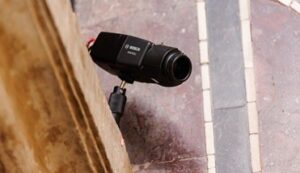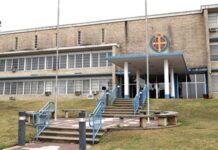
Since the end of 2023, Bosch’s artificial intelligence has been safeguarding the world-renowned Aachen Cathedral, which is more than 1,200 years old. Germany’s first UNESCO World Heritage site has been equipped by Bosch Building Technologies and the engineering firm planning with an intelligent video solution that protects it against a multitude of potential threats.
Fires, in particular, can be devastating for such a historic building of inestimable intangible value and this is precisely why Aachen Cathedral has opted for the new system, which can detect a potential danger particularly quickly: Over 50 Aviotec cameras from Bosch in 16 rooms use intelligent video analytics to visually detect smoke and flames directly at their source.
Due to AI algorithms, video cameras can also differentiate, for example, candlelight from a developing fire. This substantially reduces the likelihood of false alarms. Thus, the cameras respond much earlier than conventional ceiling-mounted fire detectors, which require smoke to rise to them.
“We are proud of this globally unique project at Aachen Cathedral,” says Dr. Marcus Nadenau, Head of the European system integrator business Energy and Building Solutions at Bosch Building Technologies. “Aviotec offers an invaluable speed advantage in fire detection, especially in buildings with complex layouts and high ceilings,” adds Dr. Nadenau.
Cathedral Master Builder, Dr. Jan Richarz, who took over the project from his predecessor, Helmut Maintz, emphasises the significance of this technology for the protection of Aachen Cathedral, supported by the Karlsverein / Cathedral Construction Association and the state of North Rhine-Westphalia, “With this video surveillance solution, Aachen is a global leader.”
“It protects our World Heritage site as reliably and innovatively as befits its historical, religious, and cultural significance. I am very satisfied with the result and the collaborative partnership,” says Dr. Richarz. Aviotec primarily secures the cathedral’s interior with its valuable relics and unique artworks, admired by over a million visitors annually.
The video solution ensures that visitors can get as close as possible to the many treasures without endangering them: Aviotec raises the alarm if someone enters the virtual exclusion zones around individual exhibits. During the day, it protects the cathedral from vandalism and theft, and at night from break-ins.
Thanks to Aviotec, visitor flows can now be managed much more efficiently, as only a limited number of people are allowed in the cathedral at any one time: The previously laborious manual counting of visitors is now undertaken by the video solution.
Bosch Building Technologies, in collaboration with the engineering firm, planned, developed, and implemented the comprehensive video solution for the cathedral. Every step was closely coordinated with the Cathedral Construction Lodge, whose challenging task is to preserve the cathedral and its treasures for the future.
“Aviotec from Bosch offers early fire detection and video security functions in one system, perfectly meeting the special protection needs of this sacred building,” says Ralf Wolters from the engineering firm planning. “Cutting-edge technology meets centuries-old treasures. This combination has excited me,” says the engineer.
An advantage of the Aachen solution is its close integration with the local fire department: As soon as one of the Aviotec cameras detects a developing fire, the Aachen professional fire department is informed via the normatively integrated fire alarm system. A monitor shows arriving firefighters live images from the cathedral and informs them about the exact location where the danger was detected.
This saves valuable time. Due to the high Aviotec standard, the fire department allowed the solution to be connected to its systems as a special detector. As the world’s first system for video-based fire detection, Aviotec was certified by VdS in 2017.
To determine the ideal position for each camera within the building, digital floor plans were initially created, followed by an elaborate 3D simulation. Heritage conservation was involved early on, allowing the video system to blend almost invisibly into the existing ensemble.
During the installation phase, more than 30 craftsmen worked in the cathedral at times, implementing electricity, lighting, and the new video solution in coordination. For the entire team, it was a special experience to work on a UNESCO World Heritage site.











